Related Research Articles

Samuel John "Lightnin" Hopkins was an American country blues singer, songwriter, guitarist and occasional pianist from Centerville, Texas. In 2010, Rolling Stone magazine ranked him No. 71 on its list of the 100 greatest guitarists of all time.

Ace Records Ltd. is a British record label founded in 1978. Initially the company only gained permission from the similarly named label based in Mississippi to use the name in the UK, but eventually also acquired the rights to publish their recordings. When Chiswick Records' pop side was licensed to EMI in 1984, Ace switched to more licensing and reissuing work. In the 1980s it also gained the licensing for Modern Records, and its follow-up company Kent Records, whilst in the 1990s, the company bought the labels including all original master tapes.
Andrew "Smokey" Hogg was an American post-war Texas blues and country blues musician.

Alger "Texas" Alexander was an American blues singer from Jewett, Texas. Some sources claim that he was the cousin of Lightnin' Hopkins, but no direct kinship has been established. It has also been asserted that he was the uncle of the Texas country blues guitarist Frankie Lee Sims.
Robert "Bob" Shad was an American record producer and record label owner. He produced the first album by Big Brother and the Holding Company. Among his labels were Time Records, Brent Records, and Mainstream Records.
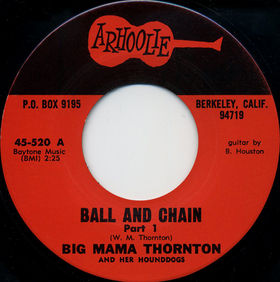
"Ball and Chain" is a blues song written and recorded by American blues artist Big Mama Thornton. Although her recording did not appear on the record charts, the song has become one of Thornton's best-known, largely due to performances and recordings by Janis Joplin.

William "Billy Boy" Arnold is an American blues harmonica player, singer and songwriter. Arnold is a self-taught harmonica player and has worked with blues legends such as Bo Diddley, Johnny Shines, Otis Rush, Earl Hooker, Howlin' Wolf, Muddy Waters and others.
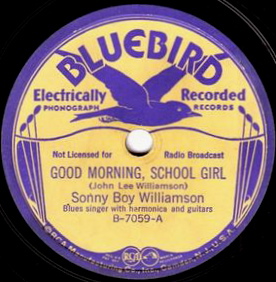
"Good Morning, School Girl" is a blues standard that has been identified as an influential part of the blues canon. Pre-war Chicago blues vocalist and harmonica pioneer John Lee "Sonny Boy" Williamson first recorded it in 1937. Subsequently, a variety of artists have recorded versions of the song, usually calling it "Good Morning Little Schoolgirl".

"Every Day I Have the Blues" is a blues song that has been performed in a variety of styles. An early version of the song is attributed to Pinetop Sparks and his brother Milton. It was first performed in the taverns of St. Louis by the Sparks brothers and was recorded July 28, 1935 by Pinetop with Henry Townsend on guitar. The song is a twelve-bar blues that features Pinetop's piano and falsetto vocal. The opening verse includes the line "Every day, every day I have the blues".
Frankie Lee Sims was an American singer-songwriter and electric blues guitarist. He released nine singles during his career, one of which, "Lucy Mae Blues" (1953), was a regional hit. Two compilation albums of his work were released posthumously.
Luke "Long Gone" Miles was an American Texas blues and electric blues singer and songwriter. He was a protégé of Lightnin' Hopkins and variously recorded or performed with Hopkins, Sonny Terry, Brownie McGhee and Willie Chambers. Miles is best known for his 1964 album Country Born, issued by World Pacific Records.
Johnny "Big Moose" Walker was an American Chicago blues and electric blues pianist and organist. He worked with many blues musicians, including Ike Turner, Sonny Boy Williamson II, Lowell Fulson, Choker Campbell, Elmore James, Earl Hooker, Muddy Waters, Otis Spann, Sunnyland Slim, Jimmy Dawkins and Son Seals.
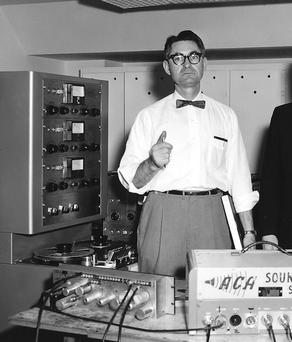
William Dwight Holford, Sr. was an American recording engineer and record producer. For 44 of those years, from 1948 to 1982, he was the affiliated with ACA Studios in Houston as an owner, partner, and audio engineer. Holford also helped build studios for several labels, including Duke/Peacock, Starday, Sarg Records, and Trumpet Records.

Texas Johnny Brown, born John Riley Brown was an American blues guitarist, songwriter and singer, best known for his composition "Two Steps from the Blues". In a lengthy career, he worked with Joe Hinton, Amos Milburn, Ruth Brown, Bobby Bland, Lavelle White, Buddy Ace and Junior Parker. He was born in Mississippi, but his long association with Houston, Texas, gave him his stage name.
"Let Me Play With Your Poodle" is a 1942 hokum blues song by the American blues musician Tampa Red. His recording reached #4 on the Billboard "Harlem Hit Parade" in March 1943, after first hitting the chart in December 1942, and the song has been recorded many times since by other artists.
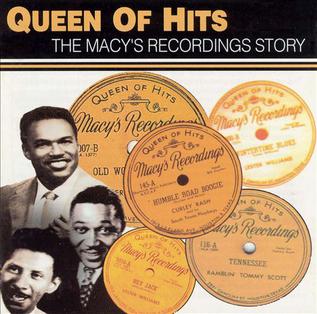
Macy's Recordings (Queen of Hits) was a Houston-based record label that released recordings of popular musicians around the southern United States. In April 1949, they famously recorded Lester Williams' song "Winter Time Blues" on their R&B series which became a hit. They would go on to record country and Cajun music as well.
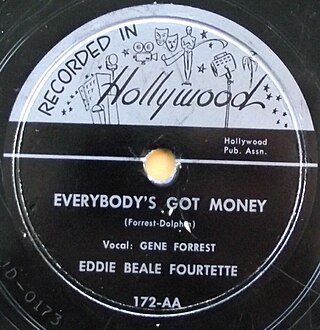
Recorded In Hollywood was an independent American record label specializing in rhythm and blues, active from the late 1940s to the end of the 1950s, which issued several sides by artists significant to the genre. John Dolphin operated the label out of his record shop, before selling it to Starday's Don Pierce. Pierce changed the name to Hollywood Records and began releasing re-issues.
Henry Qualls was an American Texas and country blues guitarist and singer. He found success late in his life after being "discovered" in 1993 by the Dallas Blues Society. He released his only album in 1994 but toured globally playing at a number of festivals.
References
- ↑ James 2003, p. 71.
- 1 2 James 2003, p. 72.
- ↑ Briggs, Keith (1993). "Big Bill Broonzy Vol 9 1939". Document Records . Retrieved December 16, 2022.
- ↑ Poe 2003, p. 55.
- 1 2 House 2010, p. 174.
- ↑ "Too Many Drivers" / "Preachin' the Blues" (Single notes). Big Bill Broonzy. Vocalion Records. 1939. Label. 05096.
{{cite AV media notes}}: CS1 maint: others in cite AV media (notes) (link) - ↑ "Published Music: January–June 1948". US Copyright Office. 1948. p. 259. Retrieved December 16, 2022.
- ↑ House 2010, p. 164, 174.
- ↑ Herzhaft 1992, p. 475.
- 1 2 Larkin 2013, p. 1999.
- 1 2 Oliver & McCormick 2019, eBook.
- ↑ "To Many Drivers"[ sic ] / "Country Gal" (Single notes). Smokey Hogg. Modern Records. 1947. Label. 20-5328.
{{cite AV media notes}}: CS1 maint: others in cite AV media (notes) (link) - ↑ "Little Car Blues" / "Country Gal" (Single notes). Smokey Hogg. Modern Records. 1951. Label. 833.
{{cite AV media notes}}: CS1 maint: others in cite AV media (notes) (link) - ↑ "Music: Current and Renewal Registrations –January–June 1971". US Copyright Office. 1971. p. 1078. Retrieved December 17, 2022.
- ↑ Govenar 2010, p. 246.
- ↑ Govenar 2010, pp. 110, 246, 259.
- ↑ Chadbourne, Eugene. "Lightnin' Hopkins: Early Recordings, Vol. 1 –Review". AllMusic . Retrieved December 29, 2022.
- ↑ Dahl, Bill. "Lightnin' Hopkins: Mojo Hand: The Anthology –Review". AllMusic . Retrieved December 29, 2022.
- ↑ "Lightnin' Hopkins: Soul Blues –Review". AllMusic . Retrieved December 29, 2022.
- ↑ Marqusee 2005, p. 191.
- 1 2 Ponton 2020, p. 182.
- 1 2 Simon 2021, eBook.
- ↑ Whitburn 1988, p. 250.
- ↑ Ryan 2004, p. 41, quoting a September 5, 1951, Billboard staff review.
- ↑ Ryan 2004, p. 41.
- ↑ "3 Big Artists 3 Big Songs ...". Billboard . Vol. 65, no. 5. January 31, 1953. p. 40. ISSN 0006-2510.
- ↑ "Top R&B Records: Record Reviews". Billboard . Vol. 65, no. 10. March 7, 1953. p. 49. ISSN 0006-2510.
- ↑ "Just Released Lowell Fulson 'Too Many Drivers'". Billboard . Vol. 74, no. 34. August 22, 1964. p. 37. ISSN 0006-2510.
- ↑ "Lowell Fulson: 'Too Many Drivers' –Appears On". AllMusic . Retrieved December 17, 2022.
- ↑ "Paul Butterfield's Better Days: It All Comes Back –Review". AllMusic . Retrieved December 17, 2022.